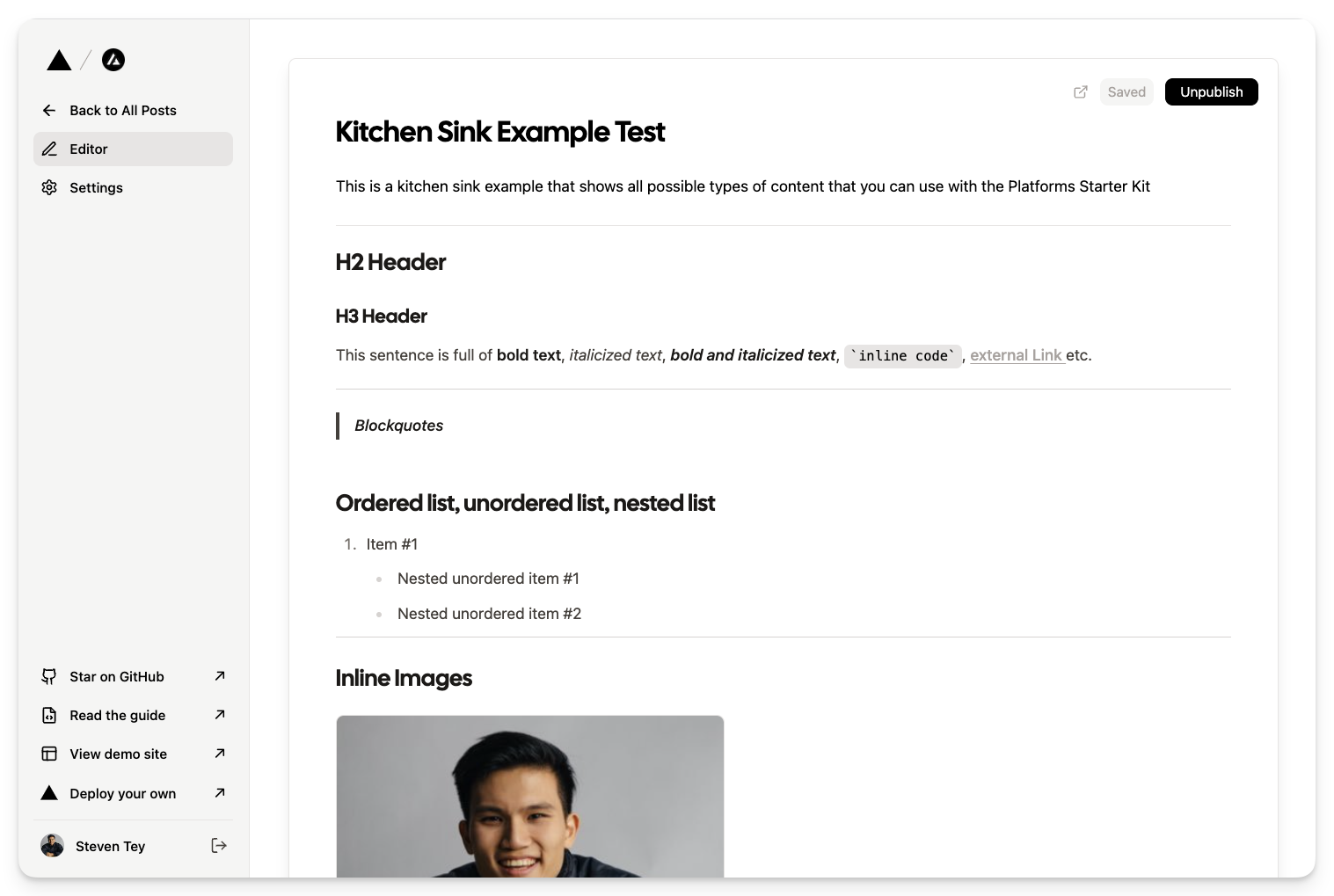
The all-in-one starter kit
for building multi-tenant applications.
Introduction · Demo · Deploy Your Own · Guide · Kitchen Sink · Contributing
The Platforms Starter Kit is a full-stack Next.js app with multi-tenancy and custom domain support. Built with Next.js App Router, Vercel Postgres and the Vercel Domains API.
Here's a quick 30-second demo:
Platforms.v2.mp4
- Multi-tenancy: Programmatically assign unlimited custom domains, subdomains, and SSL certificates to your users using the Vercel Domains API
- Performance: Fast & beautiful blog posts cached via Vercel's Edge Network, with the ability to invalidate the cache on-demand (when users make changes) using Incremental Static Regeneration + Next.js'
revalidateTagAPI - AI Editor: AI-powered Markdown editor for a Notion-style writing experience powered by Novel
- Image Uploads: Drag & drop / copy & paste image uploads, backed by Vercel Blob
- Custom styles: Custom fonts, 404 pages, favicons, sitemaps for each site via the Next.js file-based Metadata API
- Dynamic OG Cards: Each blog post comes with a dynamic OG image powered by @vercel/og
- Dark Mode: For a better user experience at night
- Multi-tenant Preview URLs: Preview changes to your client sites using Vercel Preview URLs. Learn more.

Deploy your own version of this starter kit with Vercel.
You can also read the guide to learn how to develop your own version of this template.
Multi-tenant applications serve multiple customers across different subdomains/custom domains with a single unified codebase.
For example, our demo is a multi-tenant application:
- Subdomain: demo.vercel.pub
- Custom domain: platformize.co (maps to demo.vercel.pub)
- Build your own: app.vercel.pub
Another example is Hashnode, a popular blogging platform. Each writer has their own unique .hashnode.dev subdomain for their blog:
Users can also map custom domains to their .hashnode.dev subdomain:
With the Platforms Starter Kit, you can offer unlimited custom domains at no extra cost to your customers as a premium feature, without having to worry about custom nameservers or configuring SSL certificates.
Vercel customers like Hashnode, Super, and Cal.com are building scalable platforms on top of Vercel and Next.js. There are multiple types of platforms you can build with this starter kit:
These are content-heavy platforms (blogs) with simple, standardized page layouts and route structure.
“With Vercel, we spend less time managing our infrastructure and more time delivering value to our users.” — Sandeep Panda, Co-founder, Hashnode
No-code site builders with customizable pages.
By using Next.js and Vercel, Super has fast, globally distributed websites with a no-code editor (Notion). Their customers get all the benefits of Next.js (like Image Optimization) without touching any code.
Multi-tenant authentication, login, and access controls.
With Vercel and Next.js, platforms like Instatus are able to create status pages that are 10x faster than competitors.
This working demo site was built using the Platforms Starter Kit and:
- Next.js as the React framework
- Tailwind for CSS styling
- Prisma as the ORM for database access
- Novel for the WYSIWYG editor
- Vercel Postgres for the database
- Vercel Blob for image uploads
- NextAuth.js for authentication
- Tremor for charts
- Vercel for deployment
- Start a discussion with a question, piece of feedback, or idea you want to share with the team.
- Open an issue if you believe you've encountered a bug with the starter kit.
- Steven Tey (@steventey)
The MIT License.














